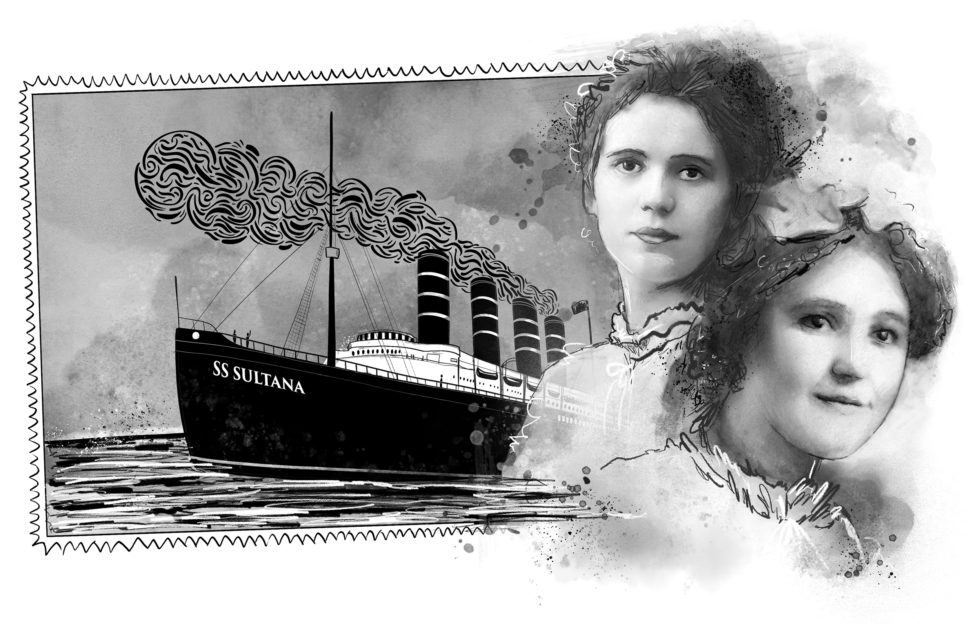
The second in our “Stories Of A Stewardess” series by Francis Myles, this gem was first published in “The People’s Friend” in 1893.
This is part one of the story, with part two coming next week.
We hope you enjoy!
“Can’t you find a job for me? Can’t you give me something to do?”
The girl was very persistent, and I took another look at her.
“I would do anything you like. Oh! You can’t tell how hard I would work to please you.”
The Scotch accent in her voice touched my heart, for it recalled to my memory the tones of a loved one who had also belonged to the land beyond the Tweed.
Her face, with its serious grey eyes, low wide brow, and rather large, firm moth, was attractive rather than beautiful.
It cost me a pang to say “no” to her again, and I felt an inward misgiving when I heard the little sigh she gave as she turned to go away, and noted the slight weary stoop of her shoulders.
“Come back,” I cried after her. “No,” I went on, shaking my head as I saw the eager look of sudden hope that leapt into and beautified her pale, sad face. “I have not changed my mind.
“But you look tired and very much done-up. Would you take something to eat?”
The tears rushed into her eyes, and a little half-sob forced itself up from the heaving breast.
“God bless you for your kind heart,” she said. “I haven’t tasted a bite today.”
My own eyes filled as I heard the sad confession, and I hurried to the steward’s pantry to find her something to eat.
Jackson growled and grumbled when he knew my errand, but all the same he put the best he had on the tray he gave me.
“Wants a situation as under-stewardess, does she?” he said, “and she’s Scotch, and good-looking, and seems half-starved. Well, here you are, an’ welcome to the wittles, but you are a softie, that you be.”
It was heart-breaking to see the famished look she cast on the tray. I set it on the little table in my own pantry, and told her just to help herself.
Then I left her, while I went to see what I could find in the way of “a piece” to give her in her pocket. We were to sail the following evening, and I had a lot to do. It never struck me that there was a danger in leaving her alone, she was not the kind of a girl one connects with dishonesty.
“I cannot speak my thanks,” she said, as I said good-bye to her, and gave her the small parcel I had made up in Jackson’s pantry. “But I pray God bless you and reward you.”
Then she crossed the gangway, and slipped away into the cold December fog. A shiver went through me as she disappeared, and I hastened below to the light and the heat.
*
During the bustle of the following day, the memory of the girl quite passed from my mind. We had an unusually large number of passengers on board, and their arrival kept me very fully occupied.
We were well down the channel ere I got breathing time, for so many ladies required a deal of attention.
“I have been so very unfortunate, Miss Symons,” old Mrs Pickering said to me as I assisted her to undress. “Just at the very last moment the maid I had engaged to go out with me sent me word that she had changed her mind.
“There was no time in which to find some one to take her place. It is so very annoying.”
It was for me, certainly, for the old lady required enough waiting upon to keep a couple of maids employed. And there were several of her kind on board the Sultana that voyage.
“I’ll be word off my feet amongst them, Jackson,” I grumbled, as I dried the silver that evening. “Such a lot of finicky old cats as they are.”
“Worn off yer feet,” Jackson said, scornfully, as he dexterously carved a foul. “A great strong woman like you! Why don’t ye let them wait upon themselves?”
“Wait upon themselves!” I said. “I wonder to hear you. Little you know about it; and here I’ve got to get one of the men to go down into the hold for me. That Mrs Captain Denham has had a box put down there by mistake, and I’ve got to hunt for it.”
“Better take care of fire,” Jackson growled after me, as I took a lantern and prepared to set out on my unwelcome errand.
For a wonder I found the small box without much difficulty. I had just given it to the sailor to carry up when a low stifled moan reached my ears.
Involuntarily I gave a start and a little scream, as I looked fearfully over my shoulder into the surrounding darkness.
“What’s that?” I cried. And the sailor, too, paused to listen.
“Hark! There it is again,” he said. “It’s some darned stowaways, I’ll be bound. Here, ma’am, you get on deck and I’ll soon get to the bottom of this.”
Very soon a search party was sent below to discover the author or authors of the sounds we had heard. Stowaways were comparatively rare on board the Sultana, as India was not nearly so tempting for them as America or our Australian colonies.
However, Captain Steele was very angry, and I felt sorry for the poor wretch or wretches. The captain’s tongue was no joke when he temper was roused.
“A woman! She has fainted. Stand back, boys; stand back and give her air.”
The hard, stern tones had left the skipper’s voice as he knelt on deck beside the stowaway whom the men had carried up.
“Here, Miss Symons,” he cried, beckoning to me, “you’d better see what you can do until Crammond comes upstairs.”
As I advanced towards where the skipper knelt, a shock went through me. For in the stowaway, I recognised the girl who had been so anxious to obtain a post as under-stewardess just before we sailed.
Very beautiful she looked as she lay so quiet, so motionless, with her sweet lips just parted enough to show a glimpse of her little white teeth, and her long curled eyelash resting on her smooth young cheek.
Her long, luxuriant black hair had become unbound, and it fell in rippling waves over her breast.
Under my directions she was carried below, and very soon our efforts were successful in restoring her to consciousness. As Dr Crammond ordered her rest and quietness, she was put to bed without any questionings.
That evening before I turned in the skipper sent for me.
“Ah! Miss Symons,” he began, in rather a constrained manner, “it seems Jackson and you know something already of our stowaway friend. Will you — ah — mind — letting me hear about it?”
“Oh! Certainly,” I answered, with a smile, “But what I’ve got to tell amounts to very little.”
“Never mind, let us hear it,” he answered. Thus commanded, I told him of the girl’s visit to the Sultana before we sailed.
“My opinion is that she returned to the ship, and slipped on board that night. The small parcel of food I gave her she must have counted upon lasting her until forced to come on deck.”
“Just so, just so,” said Captain Steele. “Poor lassie! Poor lassie!”
I looked at the skipper in surprise. Was this the orthodox way in which to talk of a stowaway? Ah! But this stowaway was young and beautiful. Could it be possible that her beauty and distress had touched the hitherto impregnable heart of our kindly skipper?
Even as I wondered thus, he began to cough and hem nervously.
“Miss Symons,” he began, looking very red and very sheepish, quite unlike his usual self. “Can you — have you — that is to say, is there no job you can give her to do under you?”
In spite of my most strenuous efforts, I am afraid I did not succeed in altogether hiding my amusement.
Shaking my head slowly, I said —
“Well, no. Of course, I could do with her help nicely, but what would the Company say?”
“Hang the Company,” promptly replied Captain Steele.
“But I’ll tell you what,” I went on, “old Mrs Pickering is badly in want of a maid. I might see if our stowaway would suit her.”
“The very thing,” the skipper answered, heartily. “Miss Symons, you’re a genius.
“And, I say,” he called after me, as I turned to go below, “if she should suit, just see that that old lady doesn’t take too great an advantage of her. You understand!”
Yes, I understood very well. Well, well. And this was how the wind blew? Men are the same all the world over.
Who amongst them can resist a pretty face and fine figure?
Look out for part two of “A Bonnie Stowaway” in next week’s Fiction newsletter.
Click here to read more of our fantastic Fiction content.
Click here to delve into our dramatic Daily Serial.




